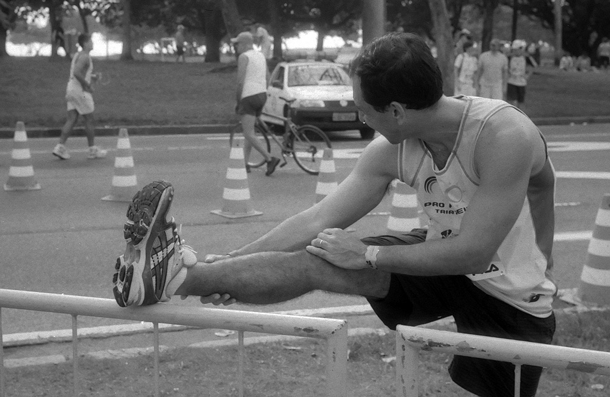The Meijer State Games of Michigan is celebrating its ten year anniversary this summer. The last ten years has brought many successes along the lines of: the addition of the Winter Games; hosting the State Games of America; and contributing to the economic growth of West Michigan by generating more than $28 million in visitor spending over ten years.
Metro Health: 6 Injury Prevention Methods For Athletes
Frank Tanana: 5 Things Every Pitcher Should Do To Get Better
If you want to watch Frank play ball these days, you’ll have to cheer along with his grandchildren as he takes the field for the Highland Park Baptist Church softball team. And, if you’re fortunate enough to speak with Frank before or after the game and ask him what it takes to be a great pitcher in the big leagues, he’s likely to tell you one of the following five things.
Kimberly Derrick: 5 Things Every Speed Skater Needs To Learn
Few people know their way around the surface of an ice skating rink as well as Kimberly Derrick. As a member of two U.S. Olympic speed skating teams, and a medal winner at two speed skating world championship events and the 2010 Olympics, Kim proved herself to be one of the best skaters on the planet.
Melissa Hehmann: 5 Supplements Athletes Should Take
When it comes to athletic performance, there are a number of factors that influence an athlete’s output. However, when you get right down to it, the components of performance that are within athletes’ control include the intensity and quality of training, and the nutritional value of what they put in their bodies… and the two are proportionally related.
Melissa says while a well-planned diet can fuel the energy and nutrient needs of most athletes, the high-demands of training can make it difficult for some. Supplementation can be beneficial to these individuals, but Melissa also cautions that athletes should consult with their physicians and dietitians that specialize in sports nutrition before starting supplementation.
1. Multivitamins
There is more to nutrition than essential proteins, fats and carbohydrates, and if you are an athlete involved in heavy training, there may be some gaps in terms of your food’s vitamin content that need to be filled. To fill these gaps, Melissa suggests the use of a multivitamin to help your body maintain its optimal performance level.
“A basic multivitamin that is age and gender appropriate may be a good start for athletes who wish to supplement their diets,” Melissa explained. “Vitamins have been under scrutiny lately as to their effectiveness, but they were never intended to be used to replace a healthy diet. A multivitamin is an inexpensive way for an athlete to complement a nutrient-dense diet.“
2. Vitamin D
While many vitamins can be obtained in abundance from a variety of food sources, vitamin D is acquired primarily through animal proteins, so getting enough of this fundamental nutrient can be challenging to athletes with a vegan or vegetarian lifestyle, or who live in certain regions or climates.
“Vitamin D can be obtained from foods like salmon and eggs and from exposure to the sun, but it can be challenging to get enough, especially if you live in the northern half of the United States or are an indoor athlete,” Melissa said. “Vitamin D promotes bone health and immune function, both necessary for an athlete’s training regimen. The Institute of Medicine recommends no more than 4000 IU of Vitamin D daily in the form of supplements.”
3. Creatine
If you’ve been in the weight room and seen a muscle-bound bodybuilder or athlete, chances are they’re taking a protein supplement. As far as legal supplements are concerned, creatine is one of the most popular and widely used supplements among athletes because of its ability to increase strength and explosiveness.
“Creatine is a naturally-occurring compound found in muscles and an important source of fuel for intense bursts of activity, which occurs in many sports,” Melissa said. “Most meat eaters consume adequate amounts of creatine in their diet. Supplementation has been shown to increase muscle strength and reduce recovery time, but isn’t recommended for young athletes. A physician should be consulted to determine if creatine is appropriate.”
4. Fish Oil
There are many reasons to consume fish, including the relative leanness of the protein contained therein. However, the most widely-publicized benefit of fish, in recent years, has been the presence of Omega 3 fatty acids within the oil of the fish. While some athletes may have an aversion to eating fish, Melissa says there are reasons to consume the oil of the fish in a supplemental form.
“Fish oil contains vital Omega-3 Fatty Acids that have been shown to reduce inflammation and boost lung function both during and after exercise,” Melissa explained. “Omega-3’s can be obtained by consuming foods like fatty fish, nuts, and seeds, but supplementation may be appropriate depending on the athlete.”
5. Beet Root Juice
When it comes to beverage options and fitness, there are several drinks that compete for an athlete’s attention. These options include a variety of pre- and post-workout selections like energy drinks and protein drinks. However, Melissa says that one of the most beneficial drink options is something that most athletes are likely to overlook completely.
“Beet root juice, which is the same as Beet Juice, not only can help with an athlete’s hydration and electrolyte balance, but also provides naturally-occurring nitrates that quickly deliver oxygen to working muscles to promote increased stamina,” Melissa said. “These nitrates can also be found in celery, radishes, arugula, and parsley. “
Melissa Hehmann, RD, CDE, ACE-CPT – Healthy Living Advisor for Meijer
The Meijer State Games of Michigan is a multi-sport, Olympic-style event(s) that welcome athletes regardless of age or ability level. The Games embody the values of participation, sportsmanship and healthy living.
Interested in our Summer Games?
www.StateGamesofMichigan.com/summergames
Interested in our Winter Games?
www.StateGamesofMichigan.com/wintergames








